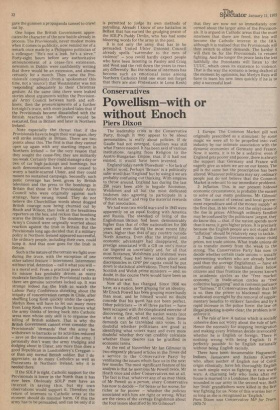Conservatives
Powellism-with or without Enoch
Piers Dixon
The leadership crisis in the Conservative Party, though it may appear to be about personalities, is really about policies. If de Gaulle had not emerged, Gaullism was still what France needed. It has been said of various institutions, ranging from Religion to the Austro-Hungarian Empire, that, if it had not existed, it would have been invented.
England today needs 'Powellism' — for lack of a better word. Perhaps 'Britain' is a politically safer word than 'England' but by using it we are probably confusing our thinking. With empires to throw around, England has during the last 250 years been able to beguile Scotsmen, Welshmen and all but the most dedicated Irishmen into agreeing to participate in a "British nation" and reap the material rewards of that association.
We had won two world wars and in 1945 were apparently on an equal footing with America and Russia. The standard of living of the Englishman/Briton had been demonstrably higher than that of other nationalities for 200 years and even during the most recent fifty years, higher than that of any country outside North America. Even after the imperial and economic advantages had disappeared, the prestige associated with a GB on one's motor car lingered on uncertainly and, for all that most Scotsmen, Welshmen and Irishmen were concerned, Suez had never taken place and discrepancies in GNP per capita could be put down to statistical aberrations. There had been Scottish and Welsh prime ministers — and, no doubt, in due course there would have been an Irishman as well.
Now all that has changed. Since 1956 we have, as a nation, been groping for an identity. Mr Enoch Powell has been groping more busily than most, and he himself would no doubt concede that his quest has not been perfect. Other politicians — in all three parties — have been occupied with the complicated exercise of discovering, first, what the nation wants (not what it can afford) and, second, how these demands can be translated into votes. It is doubtful whether politicians are good at identifying what voters want and even more doubtful whether they can credibly calculate whether those desires can be gratified in economic terms.
At the end of November Mr Ian Gilmour in two elegantly phrased articles in the Times did a service to the Conservative Party by ventilating the issues which face us in the next few months. The most significant feature of his analysis is that he mentions Mr Powell twice, Mr Heath once and other Conservatives not at all. The fact is that, whatever any of us may think of Mr Powell as a person, every Conservative has now to decide — for better or for worse, for richer or for poorer — whether the policies associated with him are right or wrong. What are the views of the average Engishman about the four issues identified by Mr Gilmour? 1. Europe. The Common Market pill was originally prescribed as a stimulant: by some magic we were all to be propelled into vast industry by our intimate association with the dynamic economies of Germany and France. Now, it seems, it is to be a sedative: even if England gets poorer and poorer, there is always the support that Germany and France will eagerly give us when we are on our knees. The pill is the same but the prescription has been altered. Whatever politicians may say, ordinary people just do not believe that the Common Market is relevant to our immediate problems.
2. Inflation. This, in our present hideous economic circumstance, is probably the easiest to solve of our many problems. Mr Gilmour cites "the control of central and local government expenditure and of the money supply" as the first (but, ifi his view, not the only) cause of the rise in prices. Although ordinary families may be confused by the politicians' jargon, they do know this — that, if the nation spends more than it earns, it gets higher prices. It is precisely because the English people are not stupid that "inflation" should be relatively easy to tackle.
3. Trade Unions. Governments cause rising prices, not trade unions. What trade unions do is to transfer money from the weak to the strong. The Conservative Party has now to decide whether certain trade unions — usually representing workers who are already better paid than the average Englishman — have an inordinate ability to blackmail their felloW citizens and thus frustrate the process known in academic circles as the "free market economy," in trade-union circles as "free collective bargaining" and in common parlance as "fairness." If Conservatives decide that this is so, then the power to blackmail must be eradicated overnight by the removal of supplementary benefits to strikers' families and by a rapid increase in the police force: the law on illegal picketing is quite clear; the problem is to enforce it.
4. The rule of law. A nation which is socially cohesive does not worry about the rule of lavi. Hence the necessity for stopping immigration and making every Irishman decide irrevocabl.Y whether he is English or foreign. There 15 nothing wrong with being English. It ls perfectly possible to be English nationallY without being English racially.
There have been innumerable Huguenots, Indians, Jamaicans and Italians (Carson) who, albeit neither of English nor of Celtic origin ethnically, have felt thoroughly English in such simple ways as fighting in two world wars. A charming lady who looks after MY house is married to a Londoner. Her father w85 wounded in our army in the second war. Both her 'Irish' grandfathers were killed in the first war fighting for us. None of this worries her ---so long as she is recognised as 'English.' Piers Dixon was Conservative MP for Truro, 1970-74


























 Previous page
Previous page